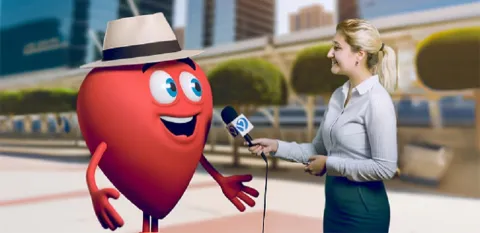An Interview with Bob’s Heart

Our UMass Memorial Health (UMMH) Simply Well team sat down with a special guest to get his POV on the importance of heart health. Below are the highlights of our Q&A session with Bob’s heart (BH).
Note: (Bob has a Boston accent)
UMMH: Thanks for sitting down with us. Can you introduce yourself?
BH: Well, I’m Bob’s heart. I’m 62 and live in his chest.
UMMH: We understand you have a challenging job, tell us what you do.
BH: I’m at the heart of Bob’s life. Get it? Ha Ha Ha! All kidding aside, my job is to pump blood throughout his body and deliver oxygen to his cells. I need things to be in tip top shape to do this because when things go wrong, bad things can happen to Bob.
UMMH: Can you tell us some of your struggles?
BH: I’m exhausted pumping his blood all day. Ya know? I mean, his arteries are all clogged up, just like route 93 south at rush hour when there’s a fender bender.
UMMH: So the blocked arteries seem to be a big issue for you. What happens when you don’t get enough oxygen?
BH: When I can’t get enough oxygen or nutrients because of these blockages and narrowed arteries, Bob could develop heart disease and suffer from a heart attack. Geesh … I’m getting stressed just thinking about it. His high blood pressure and high cholesterol certainly don’t help either. No suh.
UMMH: How are you feeling?
BH: Not too great honestly. Bob is out of breath a lot. His chest hurts sometimes. Just the other day, he was weak and was sweating. In fact, my sister is Helen’s heart, and her symptoms are different. It’s because she’s a female, ya know?! She tells me that Helen will feel pain in her jaw and back sometimes.
Some people have no symptoms. Others have mild chest pain when they’re moving around. Some people have more severe chest pain just sittin' around.
The doc tells me that not enough oxygenated blood is reaching his heart, and he’s having a little pain. When the blood supply is completely cut off, the result is gonna be a heart attack. The heart muscle starts to die. Some people may have a heart attack and never notice the symptoms. This is called a "silent" heart attack. Pretty scary stuff, right?
UMMH: That sounds awful. Do you have advice for Bob?
BH: It’ll be a wicked problem if he doesn’t take his health seriously. He’s not a smoker and partakes in an occasional alcoholic beverage. But some changes to his lifestyle sure could help the ol’ ticker.
Bob, if you’re listening, bang a u-ey. Make some changes. Let’s skip some of the fast-food meals. Boy I sure love it when you chow down on fruits and veggies and that grilled chicken salad with the balsamic dressing you’re wife makes. Mmmmm. When we were younger, we’d shoot hoops in the yard, ride the bike on the Minuteman Bike Trail and liked walking around Beantown. It was a hoot. And since you’re having some symptoms, let’s make an appointment with your primary care doc or a cardiologist. Let's be smart!
Anyway, with a few changes, let’s get your heart back in shape. I’ll be around for as long as you are, so let’s make the best of it. Ok Bud?
UMMH: Thanks for sitting down with us. We appreciated your thoughts on what’s it’s like being a heart and how important it is to take care of you.
BH: No problem. It’s been a pleasure. I don’t want to name drop or anything, but if you’re interested, I could introduce you to my cousin, Kathy … the kidney.
Note: The content of this blog is for informational purposes only. It is not intended for use as diagnosis or treatment of a health problem or as a substitute for the professional consultation of a physician or qualified health care provider. If you have specific questions or concerns regarding a health or medical condition, contact your physician or a licensed health care professional.

